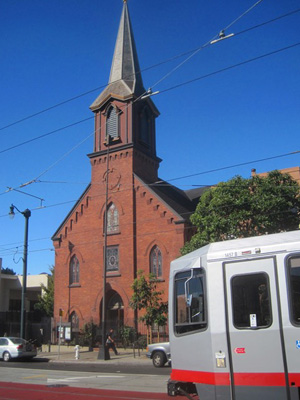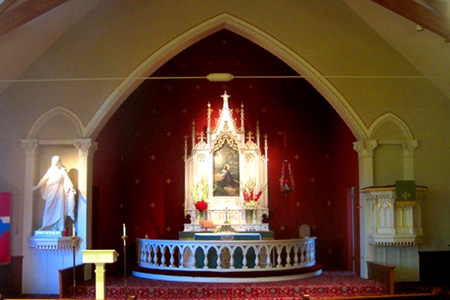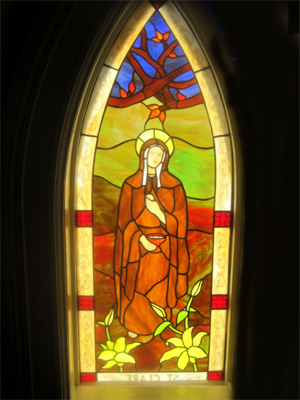| |
 |
 |
 |
| Comment on this report, or find other reports. |
 |
| Our Mystery Worshippers are volunteers who warm church pews for us around the world. If you'd like to become a Mystery Worshipper, start here. |
 |
| Find out how to reproduce this report in your church magazine or website. |
|
|
| 2602: St Francis
Lutheran, San Francisco, California, USA |
 |
 |
 |
Mystery
Worshipper: Portola.
The church: St
Francis Lutheran, San Francisco, California, USA.
Denomination: Evangelical
Lutheran Church in America.
The building: It's
in a Danish-Gothic style, put up by Danish Lutherans in 1905/1906
with funding help from Queen Louise of Denmark. It has red brick
walls with a wooden steeple. Biblical texts in Danish can be
seen in the altar area. The church was damaged twice by earthquakes:
the monumental quake of 1906 interrupted its construction, and
the 1989 quake caused a wall to collapse. The most striking
feature of this church, in my opinion, are the stained-glass
windows, having a deep, rich color and texture. The restroom
in particular is unique – it boasts two stained glass windows,
giving it a sanctified atmosphere. One of the windows depicts
St Clare of Assisi, the 13th century abbess who founded the
order of nuns known as the Poor Clares, holding a host and ciborium.
(Legend has it that Clare once warded off soldiers of the Holy
Roman Emperor Frederick II from invading her convent by holding
up the Blessed Sacrament at a window.)
The church: In
1990 St Francis Church called and ordained two lesbian pastors.
In the same year another ELCA congregation in San Francisco
ordained a gay pastor. In 1996, after years of controversy and
debate, the ELCA expelled both congregations. Since then the
ELCA has modified its views, and in 2011 St Francis voted to
come back to the ELCA. They belong to Extraordinary
Lutheran Ministries (ELM), which (quoting from their website)
"expands ministry opportunities for publicly-identified
lesbian, gay, bisexual, transgender, and queer (LGBTQ) people
called to leadership in the Lutheran church as ordained pastors
and rostered lay leaders." Among St Francis' ministries
is a meal program for homeless and needy people. This year 11,901
meals have been provided. St Francis opens its doors every Sunday
at 7.30am, offering meals, hospitality and support services
to whoever comes.
The neighborhood:
The church is located in a part of town called the Duboce Triangle,
which features attractive Victorian houses, parks and tree-lined
streets. Seven streetcar lines have stops near St Francis (including
a historic vintage line), which must be some kind of a world
record. This neighborhood was once populated heavily by Germans
and Scandinavians, who created five Lutheran churches offering
services in German, Danish, Norwegian, Swedish and Finnish.
Duboce Triangle is adjacent to the Castro District, which is
possibly the oldest, largest and most active gay community in
the world. Nearby (a 15 minute walk) is Mission Dolores, officially
Mission San Francisco de Asis; it is the oldest surviving building
in the city (built in 1776) and gave the city its name.
The cast: The
guest preacher and presider was the Revd Andreas Pielhoop, pastor
of St Matthew's German Evangelical Lutheran Church, San Francisco.
The assisting minister was the Revd Michael Bass-Deschenes.
Carol Moilan served as lector. The organist was not named.
The date & time: Sixteenth
Sunday after Pentecost, September 8, 2013, 11.00am.
What was the name of the service?
Eucharist.
How full was the building?
It was less than a quarter full, with about 40 people.
Did anyone welcome you personally?
As we entered the building we were greeted in a friendly manner
and given bulletins. We were greeted again upon entering the
sanctuary.
Was your pew comfortable?
It was comfortable.
How would you describe the pre-service
atmosphere?
It was quiet. When people greeted one another it was usually with a hug.
What were the exact opening words of the
service?
"Blessed be the Holy Trinity, one God: the Holy One who
dwells in light; Christ Jesus, who came to save sinners; the
Holy Spirit, who lives within us. Amen."
What books did the congregation use during the
service?
There were no books, but a bulletin was available with all the
words and songs of the service. The liturgy and hymns were mostly
from Evangelical Lutheran Worship.
What musical instruments were played?
Organ.
Did anything distract you?
Because it was a warm day, the windows were open, letting in the noises of the city: streetcars, trucks, airplanes. One cell phone jingled during the service.

Was the worship stiff-upper-lip, happy clappy, or
what?
It was formal Lutheran worship, but omitting words that give
God a gender, such as "Father" and "Lord".
Also the creed was missing. A crucifer led a procession to the
center of the sanctuary for the gospel reading, which is not
typical for Lutherans. A special moment in the service was the
sending out of the two deacons who were commissioned to take
communion to the sick, the homebound and the imprisoned. The
Lordís Prayer was paraphrased in such a way that it was almost
unrecognizable. It began with the words: "God, lover of
us all, most Holy One, help us to respond to you, to create
what you want for us here on earth." This paraphrase emphasized
what we as humans are capable of doing with the help of God,
whereas the original, in my opinion, emphasizes what God is
being asked to accomplish.
Exactly how long was the sermon?
17 minutes.
On a scale of 1-10, how good was the preacher?
8 – The preacher was born and trained in Germany. He showed
his German theological discipline by using every aspect of his
sermon to interpret the gospel reading. He held the attention
of the listeners with humor, quotes and illustrations. He showed
integrity in the way he dealt with a most difficult text.
In a nutshell, what was
the sermon about?
In the gospel reading (Luke 14: 25-33) Jesus talks about the
necessity of "hating" one's own family and of forsaking
all possessions in order to be a disciple. Church growth consultants
suggest that a congregation should find out what people need
and try to satisfy those needs. But Jesus contradicts this approach,
asking the impossible without regard to so-called religious
needs. Being a follower of Jesus involves some form of dying
for Jesusí sake.
Which part of the service
was like being in heaven?
Holy communion is always the moment when heaven and earth come
together. In this church it has an added dimension because of
the participation of people who in earlier times would have
felt themselves excluded because of their sexual identity.
And which part was like being in... er... the other place?
The building is guarded by a heavy metal fence with gates –
a typical sight in a big city – that shield the church
from break-ins, vandalism and unwelcome intruders. After the
service the gate could only be opened from the inside. Arguably
this protection is necessary, but it is disconcerting to enter
a church through an outer gate that turns the church into a
secure area. It makes one aware of the criminal aggressiveness
that threatens even a church serving the poor of the neighborhood.
What happened when you hung around after the service looking lost?
There was no chance to look lost. After the organ postlude,
our neighbor in the pew engaged us in friendly conversation
and invited us to the coffee fellowship.
How would you describe the after-service
coffee?
It was fine. There was also plenty to eat. People sat at tables and remained for a long time after the service.
How would you feel about making this church your regular (where 10 = ecstatic, 0 = terminal)?
7 – I am grateful for congregations like St Francis, which
embody the all-encompassing grace of God. I have no doubt that
one could find genuine Christian fellowship here. However, the
gender-neutral language would be a barrier. Addressing God simply
as "God" or "the Holy One" is too abstract
and too impersonal. Also, it is important to me, when praying
the Lordís Prayer, to have a more or less traditional formulation,
because it gives me the feeling of being connected with Christians
of all times and in all places.
Did the service make you
feel glad to be a Christian?
Yes, indeed. St Francis Church apparently pays careful attention
to the language and dignity of the liturgy. The outreach programs
are extraordinary. It would be an honor to be a part of this
unique congregation.

What one thing will you
remember about all this in seven days' time?
The restroom under the special protection of St Clare. It is
obvious that these windows were not originally meant to be part
of a WC, but ended up in this place due to creative reconstruction.
I am sure that the sacred feeling of this room contributes to
maintaining its remarkably spotless appearance. |
|
|
 |
 |
 |
| We rely on voluntary donations to stay online. If you're a regular visitor to Ship of Fools, please consider supporting us. |
 |
 |
 |
| The Mystery Pilgrim |
 |
| One of our most seasoned reporters makes the Camino pilgrimage to Santiago de Compostela in Spain. Read here. |
 |
 |
 |
| London churches |
 |
| Read reports from 70 London churches, visited by a small army of Mystery Worshippers on one single Sunday. Read here. |
| |
|
|
|
|


